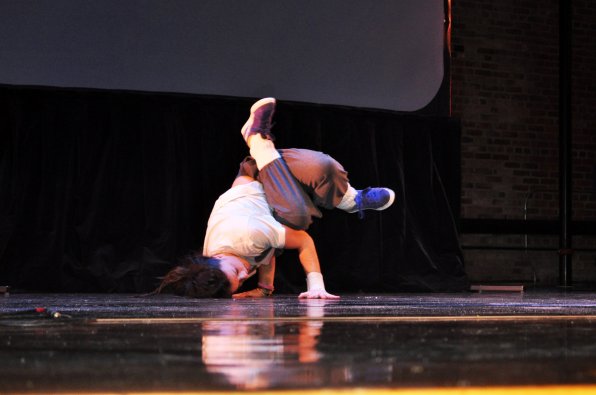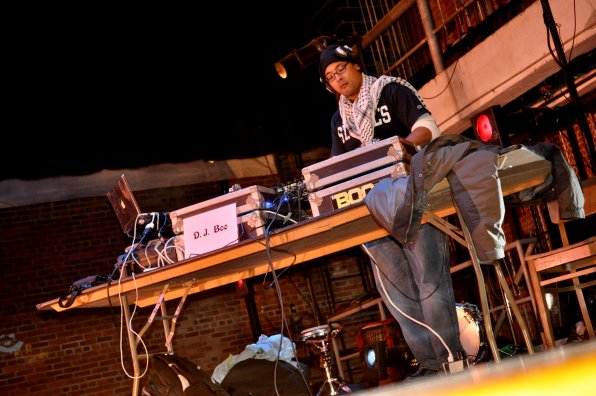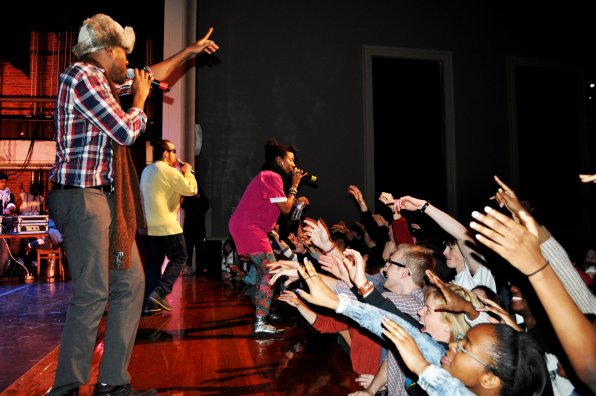A very different kind of class was in session at St. Paul’s last Monday.
Students were schooled in global awareness through international hip-hop, thanks to a visit from Nomadic Wax, an organization that “uses music, media and arts to promote global education,” according to founder and executive director Ben Herson.
Instead of math and science, students spent time in workshops about beat boxing and break dancing and learned the non-violent origins of hip-hop music, all culminating in a Monday evening show featuring performances by international hip-hop artists Mikal Amin Lee and Nomadic Massive.
“I think the shows and the jams are about having fun, giving a lot of energy,” Lee, who acted as emcee and also performed a handful of songs Monday night, said. “We all love hip-hop, and we express that on stage as well as in a workshop or classroom. We also want to give the audience a different flavor than they’re used to with hip-hop. It could be an African drummer breaking out into a traditional dance while being backed by a beat boxer. It could be rhymes and songs that jump between French and English. We want to show how universal hip-hop has become.”
Herson created Nomadic Wax in 2001 as an extension of his undergraduate thesis at Hampshire College exploring the role hip-hop played as a political tool during a 2000 election in Senegal. It quickly grew to become a fair trade record label and production company and has now expanded to international education, as the organization visits domestic schools like St. Paul’s but has also been to the Democratic Republic of Congo, Haiti and South Africa. What started as a paper has become a parade of hip-hop pedagogy.
The organization’s message, centered on the positive impact hip-hop and other music and arts can have on a community, led it to develop relationships with various artists whose music included similar themes, including Lee and Nomadic Massive, the latter of which is a Montreal-based hip-hop group featuring artists from a variety of cultural backgrounds – including Haitian – that ironically already had its name prior to connecting with Herson. The artists and groups remain their own entities but collaborate with Nomadic Wax.
The group’s focus on hip-hop, in particular, tries to shine a light on the fact that the genre’s origins weren’t based in the violence so often portrayed by modern artists and media.
“If you turn on almost any mainstream media, you are going to walk away with a largely negative perception of hip-hop if it’s not your thing,” Herson said. “But judging from my own personal experience, having traveled in a lot of countries and even in the United States, many places have taken a very different perspective, a vision of hip-hop more akin to what the practitioners formed at the beginning – that it’s a community-based, positive kind of project to get kids away from violence and gangs. When people see it for themselves, they say, ‘Okay, I get it.’ It’s people from various countries and languages collaborating on stage, and it’s not cheesy or forced – it’s just what people are doing.”
The visit to St. Paul’s was tailored specifically to the school, Herson said, something Nomadic Wax tries to do at all its stops. The trip started Sunday evening with a film screening and panel discussion about a film the group created about Haiti and was followed by a day of workshops, including freestyle rapping, drumming, beat boxing, break dancing and education on the non-violent origins of hip-hop.
The 7 p.m. show wrapped (rapped?) things up, with D.J. Boo – another artist who has worked closely with Nomadic Wax over the years – on the turntables and Lee and Nomadic Massive among the performers. Students packed the auditorium and followed Lee’s encouragement to get out of their seats and file to the front, forming a wall of fans at the edge of the stage. They were treated to hip-hop performed in a handful of languages, including English, French and Spanish, and an evening full of international flair.
For those who travel with Nomadic Wax, the music and education work hand-in-hand, and the positive vibe creates the perfect atmosphere to leave a lasting impression.
“My music breaks down to roots. Truth. Culture. Your personal roots, your heritage,” Lee said. “I speak on my own personal history, as well as the history of the African Diaspora. Truth represents the injustices I see and experience very day. And as far as the culture, I consider myself an emcee. I’m not ashamed to say ‘I am hip-hop.’ To me that’s saying I’m a folk singer, a bluesman, a jazzman or a griot. All of those traditions are wrapped in the DNA of hip-hop, and in my music. At the end of the day, my hope is to have you ask questions, and to inspire.”
It was inspiration that led Herson to create Nomadic Wax in the first place, and it’s become a lifelong passion. The former teacher on the Upper West Side in New York eschewed startup funding and instead determines funding on a project-by-project basis (for instance, Nomadic Wax and St. Paul’s negotiated a price for the recent visit).
And trips to rural schools in New Hampshire and intriguing international locales alike have allowed the group to spread the message it wants and foster positive community interactions through hip-hop and other arts.
“It was really sort of like a fantasy of mine to do something like this, so I very consciously decided to grow it organically,” Herson said. “I’ve been able to do a lot as a result of that. We’ve really built a community of people. I wanted to build a community; I didn’t want to create a company. We’ve been able to reach out internationally and get some amazing people who are on board and would do this whether they got paid or didn’t get paid, and that’s a pretty incredible thing.”











